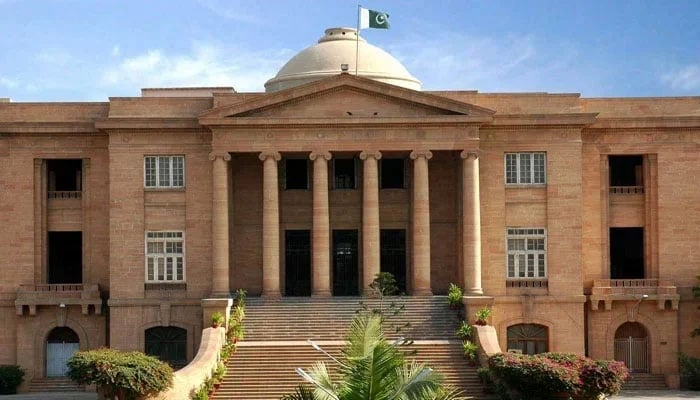No tree to be cut down in future unless absolutely necessary, rules SHC
The Sindh High Court (SHC) has ordered that no trees shall be cut down in the future within the province of Sindh without prior approval. In an order issued on Wednesday, the high court directed the secretary of the Sindh forest department to conduct a region-wise survey of the trees within Karachi.
The order came on a petition against felling of a large number of trees on University Road for the construction of the Red Line Bus Rapid Transit (BRT) corridor project. A division bench of the SHC comprising Justice Salahuddin Panhwar and Justice Amjad Ali Sahito directed the Karachi mayor to ensure that no trees were felled within the city of Karachi unless it was absolutely necessary.
The bench observed that in case of such necessity, the trees must be relocated to an appropriate location. The high court observed that this responsibility lied solely with the forest department and shall not be assumed by the local government department. The SHC also ordered that in case of removal of any tree, permission must be obtained from the sessions judge of the relevant district serving as the head of the committee in compliance with the orders of the Supreme Court.
The SHC observed that the environmental protection agency had granted approval for the subject contract on the condition that the contractor would plant five trees for every single tree that was felled.
The bench observed that a report submitted by the agency indicated that approximately 3,802 trees were cut down in the course of the project and as per the stipulated policy, the contractor was obligated to plant five trees for each tree removed.
The SHC observed that it had come to its attention that this obligation had not been fulfilled by the contractor. It observed that global warming, which is the gradual increase in Earth’s temperature due to excessive accumulation of greenhouse gases, is one of the most pressing issues being faced by the humankind today.
The high court observed that cities like Karachi, where dense urbanisation has resulted in limited green cover, were particularly at risk and the city had suffered from extreme heatwaves in recent years, resulting in loss of lives and severe impacts on public health.
The SHC observed that cutting down trees, especially in urban centres like Karachi and rural parts of Sindh, led to disastrous environmental consequences. The bench observed that deforestation reduced the number of trees that could absorb carbon dioxide, leading to an increase in greenhouse gas emissions.
The high court observed that the need for tree plantation in Karachi and Sindh was undeniable, given the severe impacts of global warming and climate change on the region. The high court observed that planting trees was not just an environmental necessity but a survival strategy for cities facing rising temperatures, pollution and declining air quality.
By prioritising large-scale plantation projects and preventing further deforestation, Pakistan could mitigate the effects of global warming and safeguard its environment for future generations, the bench remarked.
The SHC observed that in the light of the current environmental challenges, immediate action was required to ensure a sustainable and resilient future. It added that tree plantation campaigns were a vital part of this action plan, providing both short-term relief and long-term benefits in the fight against climate change.
The SHC observed that it had directed the mayor to submit a policy regarding tree plantation, particularly in relation to activities conducted over the last five years concerning the subject matter, but the mayor failed to appear without a prior notice and also failed to submit the required report.
The SHC issued a show-cause notice to Karachi Mayor Murtaza Wahab for his failure to comply with the court directions. The high court also issued notice to the contractor of the Red Line BRT project and called his comments on October 22.
The transport authorities, however, denied the petitioners’ claim that 50,000 trees would be felled, and submitted that as per a survey, around 4,000 trees were to be cut down and the contractor was bound to relocate those plants or plant five trees for every tree removed.
Government officials said the BRT project was initiated after completing all the codal formalities and seeking approval from the relevant authorities, including the Sindh Environmental Protection Agency.
-
 Cancer-stricken King Charles At Breaking Point?
Cancer-stricken King Charles At Breaking Point? -
 Andrew Leaves King Charles No More Moves To Play: ‘Can’t Just Say We Got Nothing’
Andrew Leaves King Charles No More Moves To Play: ‘Can’t Just Say We Got Nothing’ -
 Sterling K. Brown Explains How Sharing His Kids' Photos On Social Media Can Keep Them Safe
Sterling K. Brown Explains How Sharing His Kids' Photos On Social Media Can Keep Them Safe -
 Keir Starmer Gives Major Advise To King Charles Amid Andrew Scandal
Keir Starmer Gives Major Advise To King Charles Amid Andrew Scandal -
 Nick Reiner Pleads Not Guilty In Famous Parents' Double Murder Which Shocked The World
Nick Reiner Pleads Not Guilty In Famous Parents' Double Murder Which Shocked The World -
 Benicio Del Toro On Losing Mom In Chldhood: 'I’m Still Dealing With It'
Benicio Del Toro On Losing Mom In Chldhood: 'I’m Still Dealing With It' -
 More Than 500,000 Without Power As Blizzard Hits US Northeast
More Than 500,000 Without Power As Blizzard Hits US Northeast -
 Winona Ryder Lands Secret Role In 'Wednesday' Season Three, Marking Reunion With Tim Burton
Winona Ryder Lands Secret Role In 'Wednesday' Season Three, Marking Reunion With Tim Burton -
 Andrew, Fergie’s Life Without The Bells And Whistles Turns Grimmer: ‘A Lot More Was Happening’
Andrew, Fergie’s Life Without The Bells And Whistles Turns Grimmer: ‘A Lot More Was Happening’ -
 Nicole Kidman And Keith Urban's Divorce Drama Deepens As Teen Daughters 'stick' By Their Mother's Side
Nicole Kidman And Keith Urban's Divorce Drama Deepens As Teen Daughters 'stick' By Their Mother's Side -
 William, Kate Desperate To Make Public Statement Distancing Themselves From Andrew
William, Kate Desperate To Make Public Statement Distancing Themselves From Andrew -
 Charli Xcx Details Boozy Second Wedding To The 1975's George Daniel: 'Everyone Was Hungover'
Charli Xcx Details Boozy Second Wedding To The 1975's George Daniel: 'Everyone Was Hungover' -
 Gracie Abrams Follows 'Kylie Jenner Playbook' With Paul Mescal Romance
Gracie Abrams Follows 'Kylie Jenner Playbook' With Paul Mescal Romance -
 Dua Lipa Shares 'Love Letter' With New Boyfriend After Emily Ratajkowski Confirms Romance With Her Previous Beau
Dua Lipa Shares 'Love Letter' With New Boyfriend After Emily Ratajkowski Confirms Romance With Her Previous Beau -
 Brazilian Beauty Influencer Passes Away After Suffering 'medical Emergency'
Brazilian Beauty Influencer Passes Away After Suffering 'medical Emergency' -
 Sarah Ferguson Turns Into A Bulldozer With Beatrice, Eugenie: ‘Help Me Out’
Sarah Ferguson Turns Into A Bulldozer With Beatrice, Eugenie: ‘Help Me Out’




